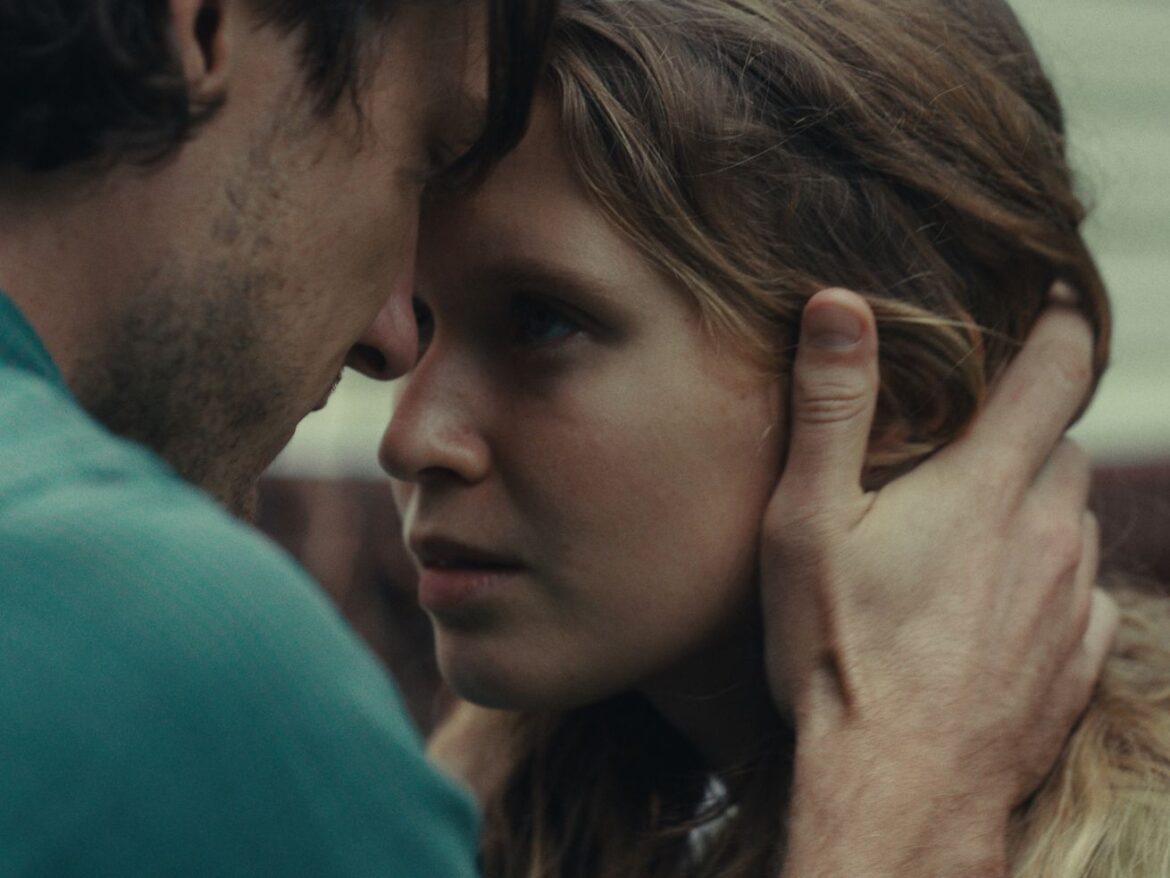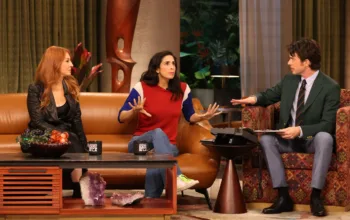Laurel Parmet on making a movie about a girl and her youth pastor that refuses easy answers.
Five minutes into The Starling Girl, Laurel Parmet’s new film about a girl growing up in a fundamentalist Christian community, I needed to stop and take a breath. What I saw onscreen in the story of that girl, Jem, was so vibrantly authentic to my own experience in a similar community that my heart was racing. I paused my screener and, after a couple deep breaths, I plunged back in. I’m so glad I did.
Afterward, I told several friends that Parmet, the writer and director, must have grown up the same way as me. Otherwise, how could she get so many details about being a teenage girl in that community so right? The clothing, the music, the feeling of shame, the odd terms for dating practices (like “courting”) — it was all so specific and vivid.
I soon learned that I was wrong. Parmet didn’t grow up in a community like Jem’s. But for her first feature film, she wanted to tell this story. Jem Starling (Eliza Scanlen, of Sharp Objects, Little Women, and Babyteeth) is 17 and on the cusp of womanhood, devoted to her community and especially the dance troupe she participates in at church. But when her married youth pastor Owen Taylor (Lewis Pullman, from Bad Times at the El Royale and Top Gun: Maverick) starts paying attention to her, she finds herself entangled with him in a way that defies her beliefs and topples her sense of self.
Parmet had a very distinct sense of what she wanted to do by telling this story, and the result is lush and challenging and moving all at once. Now that The Starling Girl is coming to theaters, I got to ask her about tackling such a tricky story with both empathy and an understanding of what’s really happening in Jem’s life.
The following conversation has been edited and condensed for clarity. Some spoilers follow.
/cdn.vox-cdn.com/uploads/chorus_asset/file/24647064/DSC03751.JPG)
Phil Parmet / Bleecker Street
This is a movie about a delicate subject. But for you, The Starling Girl stems from a personal story. How did your own experience lead into making this film?
When I was a teenager, I had a relationship with an older man. At the time, I didn’t see myself as a victim. I didn’t feel like I was being taken advantage of in any way. I considered myself quite mature.
After it ended, I had a lot of negative feelings about it. But I didn’t really know why, and didn’t care to delve too deeply.
Flash forward years later: I found myself in Oklahoma doing research for a different project and came across a group of women from a patriarchal church. At first I was just spending time with them for research for this other project. I learned about their beliefs — that they believed that it was a woman’s responsibility to not lead a man into temptation, and that their bodies didn’t really belong to them. My initial reaction was shock.
But then the more that I thought about it, the more I saw how much we had in common, in terms of what we were taught to believe about our desires and our relationship with our bodies and society’s attitudes toward our sexuality.
This was a critical turning point for me. It made me reflect back on my relationship in ways that I hadn’t before. And it made me realize this guilt that I carried, that I don’t think I was really aware of. It made me start to ask questions: Why did I feel this guilt, despite the fact that he really was taking advantage of me? Where does that come from? Why do I have those feelings?
I realized that sexual shame and seeking worth in men are really these universal experiences for women, no matter how you grew up. So I wanted to make a film looking back at my experiences and exploring these universal feelings and setting it in this world that is very specific, but really is a reflection of our culture at large.
A huge challenge with a film like this is that audiences are primed to take sides immediately, which prevents emotional reactions to the story being told. You actively tried to push back against that with this movie. There’s a sense, for instance, that Jem is caught up in a heart-racing romance, in part because we see how she looks at Owen and feel her excitement at sneaking out to see him. How did you do that?
I wanted the audience to be completely in Jem’s perspective. I wanted them to experience everything she was experiencing in order to really show what it’s like to get wrapped up in something that is intoxicating and exciting, and to show how anybody can fall into situations like this.
It was important to me to focus on the nuances — to show a more nuanced case of an abuse of power and an abusive relationship. Of course, there are many cases of abuse where it is very black and white. But I think in order to fully understand abuse, we have to look at more nuanced cases as well. If you only focus on the victimization, you’re only telling one side of the story. When it’s only framed as this black-and-white thing, it can be harder for people going through it to actually recognize what’s happening. Then you end up doing essentially what I had done, which is denying wounds because you think they’re not serious enough.
My hope with this film is that people will see how complicated these situations can be. We can be exploited, while also wielding power. Both of those things are truths.
/cdn.vox-cdn.com/uploads/chorus_asset/file/24647074/13_colored.jpg)
Brian Lannin / Bleecker Street
The way that I tried to do that in the filmmaking was to create what I’ve been calling a “studied nonchalance.” I wanted to ground the audience in Jem’s perspective, and I didn’t want to force certain interpretations onto them. I wanted the audience to be able to come to conclusions on their own.
That extended from every part of the filmmaking process. That was casting, that was in the locations that we looked for, that was in how we shot it, how we edited, the music. It was all about looking for ways to ground the audience in Jem’s experience so that we are with her moment to moment. Everything feels organic, rather than the audience being aware that they’re being manipulated. I was looking for music that would evoke a feeling and make you feel connected with Jem, but not push an interpretation.
A lot of that must come from directing the actors, too.
My favorite part of directing this film in the performances was trying to get that balance, and making sure that Jem has agency. She is a sexual being, she has sexual desires, and we want to show that. But at the same time, there is an abuse of power, and Owen is often manipulating her. I really wanted to take the audience on this ride, where they get wrapped up in this romance momentarily, and then take a step back and think, “Oh, wait. Why did I want that?”
I wanted to do that throughout the film — to have the audience constantly be trying to figure out how they feel about it. That’s the way that I like to watch movies. That’s when I feel the most engaged.
From a filmmaking perspective, those are really fun scenes to direct. I knew in the editing room that I needed to give myself flexibility to be able to get that balance right; I knew it could change based on what scenes get cut out of the movie or what shots we decided to choose. It all was very organic. In rehearsing and directing the actors, especially Lewis [Pullman, who plays Owen], I wanted to get different versions of performances so that I could manipulate who has the power and how we want the audience to feel about these characters in the film. Being able to adjust those and to be flexible was so important, and really fun to realize.
A really hard part of this seems like creating the character of Owen. Because he is the adult here, and he has the power. But he’s also been emotionally stunted by his community, and he’s caught himself up in something that he’s not sure how to handle.
Oh, absolutely.
How did you think about that when you were writing his character and directing Lewis?
When we were first casting for Owen, I was looking for someone who had charisma and a gentleness to him. I didn’t want audiences to be immediately repulsed by him. I wanted them to fall for him in the way that Jem falls for him and understand why she falls for him.
I also wanted to create a character who wasn’t this one-dimensional, evil guy. I just think that’s boring. He is lost. He’s searching. And he is under the influence of patriarchal rule. It’s possible that he’s not even aware that he’s a groomer, and thinks that he’s engaging in this consensual affair — which I think ultimately is more of an indictment on him, because he has power in the situation and he’s more concerned about himself than about her.
I also wanted to create a character who represented open-mindedness and more liberal thought, so that audiences feel like, “Oh, maybe he could be this positive force in her life.” And then he ends up being just as horrible as everyone else.
/cdn.vox-cdn.com/uploads/chorus_asset/file/24647076/StarlingGirl_Still_01_041023.jpg)
Brian Lannin / Bleecker Street
In directing Lewis, it was always about looking for the humanity in Owen and understanding why he makes the choices that he does — and he does some horrible things. Making this character feel grounded and human just makes the story more believable, probably, and helps us to relate to Jem better. It’s more engaging, ultimately.
Something else that I thought was interesting with his character too: Jem doesn’t necessarily have the grand aspirations that we’re putting on her, right? She says that she likes Kentucky, and she likes where she lives. Owen is very much like, “No, you need to explore the world and you need to want more.” As viewers, maybe we are projecting onto her what we think is best for her, and not actually taking into account what she might want, what’s actually best for her.
I love how much of your focus is on the audience and how they’ll feel and react. You’ve been showing the film at festivals, starting at Sundance in January. How have the audiences reacted?
The reactions have been really positive. People who grew up in those communities, or people who come from backgrounds where there has been church abuse, have expressed to me that it feels very authentic to their experiences. That’s been really heartening, and I feel like I accomplished what I set out to do, because it is such a delicate dance.
I’ve come away from this with a sense that it’s okay that I don’t know how I feel about [that past relationship], and that it changes. Before, I felt like I had to have a definitive answer. And I don’t. It changes every day.
But I’m okay with that, and that feels good.
The Starling Girl opens in limited theaters on May 12.



